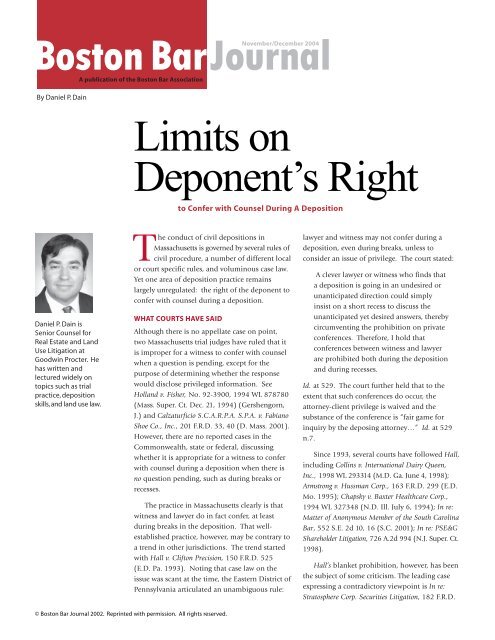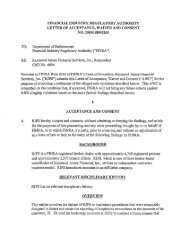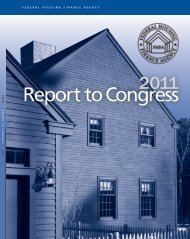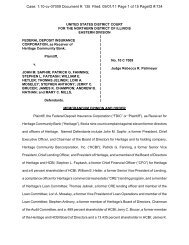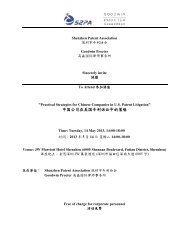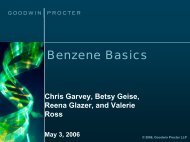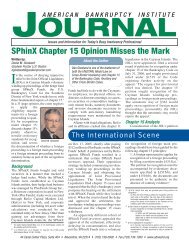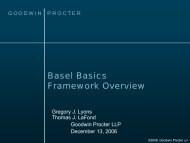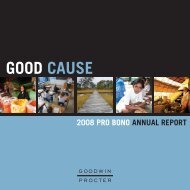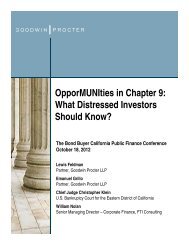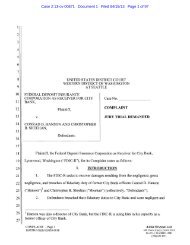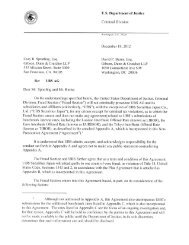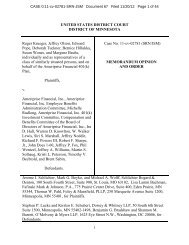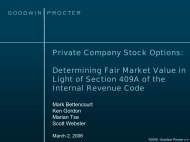"Limits on Deponent's Right to Confer with Counsel During a ...
"Limits on Deponent's Right to Confer with Counsel During a ...
"Limits on Deponent's Right to Confer with Counsel During a ...
You also want an ePaper? Increase the reach of your titles
YUMPU automatically turns print PDFs into web optimized ePapers that Google loves.
Bost<strong>on</strong> BarJournal<br />
November/December 2004<br />
A publicati<strong>on</strong> of the Bost<strong>on</strong> Bar Associati<strong>on</strong><br />
By Daniel P. Dain<br />
<str<strong>on</strong>g>Limits</str<strong>on</strong>g> <strong>on</strong><br />
Dep<strong>on</strong>ent’s <strong>Right</strong><br />
<strong>to</strong> C<strong>on</strong>fer <strong>with</strong> <strong>Counsel</strong> <strong>During</strong> A Depositi<strong>on</strong><br />
Daniel P. Dain is<br />
Senior <strong>Counsel</strong> for<br />
Real Estate and Land<br />
Use Litigati<strong>on</strong> at<br />
Goodwin Procter. He<br />
has written and<br />
lectured widely <strong>on</strong><br />
<strong>to</strong>pics such as trial<br />
practice, depositi<strong>on</strong><br />
skills, and land use law.<br />
The c<strong>on</strong>duct of civil depositi<strong>on</strong>s in<br />
Massachusetts is governed by several rules of<br />
civil procedure, a number of different local<br />
or court specific rules, and voluminous case law.<br />
Yet <strong>on</strong>e area of depositi<strong>on</strong> practice remains<br />
largely unregulated: the right of the dep<strong>on</strong>ent <strong>to</strong><br />
c<strong>on</strong>fer <strong>with</strong> counsel during a depositi<strong>on</strong>.<br />
WHAT COURTS HAVE SAID<br />
Although there is no appellate case <strong>on</strong> point,<br />
two Massachusetts trial judges have ruled that it<br />
is improper for a witness <strong>to</strong> c<strong>on</strong>fer <strong>with</strong> counsel<br />
when a questi<strong>on</strong> is pending, except for the<br />
purpose of determining whether the resp<strong>on</strong>se<br />
would disclose privileged informati<strong>on</strong>. See<br />
Holland v. Fisher, No. 92-3900, 1994 WL 878780<br />
(Mass. Super. Ct. Dec. 21, 1994) (Gershengorn,<br />
J.) and Calzaturficio S.C.A.R.P.A. S.P.A. v. Fabiano<br />
Shoe Co., Inc., 201 F.R.D. 33, 40 (D. Mass. 2001).<br />
However, there are no reported cases in the<br />
Comm<strong>on</strong>wealth, state or federal, discussing<br />
whether it is appropriate for a witness <strong>to</strong> c<strong>on</strong>fer<br />
<strong>with</strong> counsel during a depositi<strong>on</strong> when there is<br />
no questi<strong>on</strong> pending, such as during breaks or<br />
recesses.<br />
The practice in Massachusetts clearly is that<br />
witness and lawyer do in fact c<strong>on</strong>fer, at least<br />
during breaks in the depositi<strong>on</strong>. That wellestablished<br />
practice, however, may be c<strong>on</strong>trary <strong>to</strong><br />
a trend in other jurisdicti<strong>on</strong>s. The trend started<br />
<strong>with</strong> Hall v. Clift<strong>on</strong> Precisi<strong>on</strong>, 150 F.R.D. 525<br />
(E.D. Pa. 1993). Noting that case law <strong>on</strong> the<br />
issue was scant at the time, the Eastern District of<br />
Pennsylvania articulated an unambiguous rule:<br />
lawyer and witness may not c<strong>on</strong>fer during a<br />
depositi<strong>on</strong>, even during breaks, unless <strong>to</strong><br />
c<strong>on</strong>sider an issue of privilege. The court stated:<br />
A clever lawyer or witness who finds that<br />
a depositi<strong>on</strong> is going in an undesired or<br />
unanticipated directi<strong>on</strong> could simply<br />
insist <strong>on</strong> a short recess <strong>to</strong> discuss the<br />
unanticipated yet desired answers, thereby<br />
circumventing the prohibiti<strong>on</strong> <strong>on</strong> private<br />
c<strong>on</strong>ferences. Therefore, I hold that<br />
c<strong>on</strong>ferences between witness and lawyer<br />
are prohibited both during the depositi<strong>on</strong><br />
and during recesses.<br />
Id. at 529. The court further held that <strong>to</strong> the<br />
extent that such c<strong>on</strong>ferences do occur, the<br />
at<strong>to</strong>rney-client privilege is waived and the<br />
substance of the c<strong>on</strong>ference is “fair game for<br />
inquiry by the deposing at<strong>to</strong>rney…” Id. at 529<br />
n.7.<br />
Since 1993, several courts have followed Hall,<br />
including Collins v. Internati<strong>on</strong>al Dairy Queen,<br />
Inc., 1998 WL 293314 (M.D. Ga. June 4, 1998);<br />
Armstr<strong>on</strong>g v. Hussman Corp., 163 F.R.D. 299 (E.D.<br />
Mo. 1995); Chapsky v. Baxter Healthcare Corp.,<br />
1994 WL 327348 (N.D. Ill. July 6, 1994); In re:<br />
Matter of An<strong>on</strong>ymous Member of the South Carolina<br />
Bar, 552 S.E. 2d 10, 16 (S.C. 2001); In re: PSE&G<br />
Shareholder Litigati<strong>on</strong>, 726 A.2d 994 (N.J. Super. Ct.<br />
1998).<br />
Hall’s blanket prohibiti<strong>on</strong>, however, has been<br />
the subject of some criticism. The leading case<br />
expressing a c<strong>on</strong>tradic<strong>to</strong>ry viewpoint is In re:<br />
Stra<strong>to</strong>sphere Corp. Securities Litigati<strong>on</strong>, 182 F.R.D.<br />
© Bost<strong>on</strong> Bar Journal 2002. Reprinted <strong>with</strong> permissi<strong>on</strong>. All rights reserved.
Bost<strong>on</strong> BarJournal<br />
November/December 2004<br />
By Daniel P. Dain<br />
614 (D. Nev. 1998). There, the District Court for<br />
the District of Nevada wrote:<br />
[T]his Court is of the opini<strong>on</strong> that the<br />
Hall decisi<strong>on</strong> goes <strong>to</strong>o far and its strict<br />
adherence could violate the right <strong>to</strong><br />
counsel… If [breaks] are requested by the<br />
dep<strong>on</strong>ent or dep<strong>on</strong>ent’s counsel, and the<br />
interrogating at<strong>to</strong>rney is in the middle of<br />
a questi<strong>on</strong>, or is following a line of<br />
questi<strong>on</strong>s which should be completed,<br />
the break should be delayed until a<br />
questi<strong>on</strong> is answered or a line of questi<strong>on</strong>s<br />
has been given a reas<strong>on</strong>able time <strong>to</strong><br />
be pursued… So l<strong>on</strong>g as at<strong>to</strong>rneys do not<br />
demand a break in the questi<strong>on</strong>s, or<br />
demand a c<strong>on</strong>ference between questi<strong>on</strong>s<br />
and answers, the Court is c<strong>on</strong>fident that<br />
the search for truth will adequately<br />
prevail.<br />
Id. at 620-21. See also State v. King, 520 S.E.2d<br />
875, 882 (W.V. 1999); McKinley Infuser, Inc. v.<br />
Zdeb, 200 F.R.D. 648, 650 (D. Col. 2001); Damaj<br />
v. Farmers Ins. Co., 164 F.R.D. 559, 560-61 (N.D.<br />
Ok. 1995), Od<strong>on</strong>e v. Croda Int’l Plc., 170 F.R.D.<br />
66, 68 (D.D.C. 1997); Phinney v. Paulshock, 181<br />
F.R.D. 185, 205 (D.N.H. 1998).<br />
ON WHICH SIDE OF THE DEBATE ARE<br />
MASSACHUSETTS COURTS LIKELY TO FALL?<br />
Massachusetts courts have yet <strong>to</strong> address this<br />
issue head <strong>on</strong>, although a number of Massachusetts<br />
courts have cited <strong>with</strong> approval the general<br />
discussi<strong>on</strong> of depositi<strong>on</strong> abuses in Hall. See, e.g.,<br />
Dominick v. Troscoso, No. Civ. A 94-2395-B, 1996<br />
WL 408769, *3 (Mass. Super. Ct. July 17, 1996)<br />
(Grabau, J.) (actually quoting the Hall v. Clift<strong>on</strong><br />
Precisi<strong>on</strong> language, “‘I hold that a lawyer and<br />
client do not have an absolute right <strong>to</strong> c<strong>on</strong>fer<br />
during the course of the client’s depositi<strong>on</strong>’”);<br />
Cholfin v. Gord<strong>on</strong>, No. CA943623, 1995 WL<br />
809916 (Mass. Super. Ct. March 22, 1995)<br />
(McHugh, J) (citing Hall for the propositi<strong>on</strong> that,<br />
“[t]he witness comes <strong>to</strong> the depositi<strong>on</strong> <strong>to</strong> testify,<br />
not <strong>to</strong> indulge in a parody of Charlie McCarthy,<br />
<strong>with</strong> lawyers coaching or bending the witness’s<br />
words <strong>to</strong> mold a legally c<strong>on</strong>venient record”);<br />
Meehan v. Town Lyne House Restaurant, No.<br />
925584C, 1994 WL 902907 (Mass. Super. Ct.<br />
Aug. 29, 1994) (McHugh, J.) (same); Holland v.<br />
Fisher, No. 92-3900, 1994 WL 878780 (Mass.<br />
Super. Ct. Dec. 21, 1994) (Gershengorn, J.)<br />
(same).<br />
Despite the Massachusetts courts’ endorsement<br />
of Hall’s general view <strong>to</strong>ward depositi<strong>on</strong><br />
abuses, it is hard <strong>to</strong> imagine that there will be a<br />
full embrace of that case’s blanket prohibiti<strong>on</strong> of<br />
at<strong>to</strong>rney-client/witness c<strong>on</strong>ferences <strong>on</strong>ce the<br />
depositi<strong>on</strong> begins. While c<strong>on</strong>ferences during the<br />
c<strong>on</strong>duct of depositi<strong>on</strong>s certainly provide an<br />
opportunity for improper coaching, an adopti<strong>on</strong><br />
of Hall’s blanket prohibiti<strong>on</strong> would be both<br />
c<strong>on</strong>trary <strong>to</strong> local practice and more drac<strong>on</strong>ian<br />
than the dilemma merits. More likely, Massachusetts<br />
courts, if presented <strong>with</strong> the questi<strong>on</strong>,<br />
would look <strong>to</strong> the sensible middle ground<br />
espoused in In re: Stra<strong>to</strong>sphere that provides a<br />
safeguard against overt witness coaching during<br />
breaks, while permitting the at<strong>to</strong>rney <strong>to</strong> fulfill<br />
his or her role as counselor. That court focused<br />
<strong>on</strong> two key points: (1) who requested the break,<br />
and (2) whether the particular line of questi<strong>on</strong>ing<br />
has been completed. In short, it would be<br />
inappropriate for a dep<strong>on</strong>ent or his or her<br />
counsel <strong>to</strong> s<strong>to</strong>p a depositi<strong>on</strong> during a line of<br />
questi<strong>on</strong>ing <strong>to</strong> c<strong>on</strong>fer. Dep<strong>on</strong>ent and counsel<br />
may c<strong>on</strong>fer during a break up<strong>on</strong> the c<strong>on</strong>clusi<strong>on</strong><br />
of a line of questi<strong>on</strong>ing agreed <strong>to</strong> by the deposing<br />
counsel. At that time, counsel and witness could<br />
discuss both procedural depositi<strong>on</strong> issues, such as<br />
the lawyer cauti<strong>on</strong>ing the witness <strong>to</strong> answer <strong>on</strong>ly<br />
the specific questi<strong>on</strong>s asked, and substantive<br />
issues, such as anticipating what questi<strong>on</strong>s might<br />
be coming after the break.<br />
THE DEPOSING ATTORNEY: HOW TO HANDLE<br />
REQUESTS FOR BREAKS<br />
The practical utility of depositi<strong>on</strong> rules regarding<br />
c<strong>on</strong>ferences is limited by the fact that there is<br />
often neither an immediate nor an ec<strong>on</strong>omic<br />
method of enforcement. Except in extraordinary<br />
circumstances, there is no judge present <strong>to</strong> halt<br />
improper c<strong>on</strong>duct, and the transacti<strong>on</strong> costs<br />
associated <strong>with</strong> seeking court interventi<strong>on</strong> make<br />
that route not wholly satisfying. The at<strong>to</strong>rney<br />
taking the depositi<strong>on</strong> can <strong>on</strong>ly do so much <strong>to</strong><br />
© Bost<strong>on</strong> Bar Journal 2002. Reprinted <strong>with</strong> permissi<strong>on</strong>. All rights reserved.
Bost<strong>on</strong> BarJournal<br />
November/December 2004<br />
By Daniel P. Dain<br />
prevent inappropriate at<strong>to</strong>rney-client/witness<br />
c<strong>on</strong>ferences. A deposing at<strong>to</strong>rney who is<br />
presented <strong>with</strong> a request for a break during a line<br />
of questi<strong>on</strong>ing should ask if the pending<br />
questi<strong>on</strong> has raised an issue of privilege. If the<br />
answer is no, the depositi<strong>on</strong>ing at<strong>to</strong>rney should<br />
politely state that a questi<strong>on</strong> is pending, and<br />
offer a break at the c<strong>on</strong>clusi<strong>on</strong> of the current line<br />
of questi<strong>on</strong>ing. In most instances, at this point,<br />
the witness and opposing counsel will agree and<br />
permit the depositi<strong>on</strong> <strong>to</strong> proceed. At times,<br />
however, witnesses and counsel will walk out of<br />
the room <strong>with</strong> a questi<strong>on</strong> pending or during a<br />
line of questi<strong>on</strong>ing. In that case, the deposing<br />
at<strong>to</strong>rney should make a statement for the record<br />
as <strong>to</strong> what has occurred. When the witness and<br />
counsel later return, the at<strong>to</strong>rney should ask the<br />
witness about his discussi<strong>on</strong>s <strong>with</strong> counsel<br />
during the recess. This will sometimes result in<br />
an instructi<strong>on</strong> not <strong>to</strong> answer <strong>on</strong> the ground of<br />
at<strong>to</strong>rney-client privilege. At this point, the goal<br />
is <strong>to</strong> build a clear record in case court interventi<strong>on</strong><br />
and sancti<strong>on</strong>s later seem appropriate.<br />
THE DEFENDING ATTORNEY: WHEN TO ASK<br />
FOR BREAKS<br />
The lack of clear guidance in the procedural rules<br />
and case law, coupled <strong>with</strong> the fact that the risk<br />
of immediate court interventi<strong>on</strong> is virtually n<strong>on</strong>existent<br />
also present a dilemma <strong>to</strong> the at<strong>to</strong>rney<br />
defending the depositi<strong>on</strong>: how <strong>to</strong> handle a<br />
situati<strong>on</strong> where the witness is struggling or<br />
otherwise in need of advice. A defending<br />
at<strong>to</strong>rney who anticipates a problem <strong>with</strong> a<br />
witness’s resp<strong>on</strong>ses may want <strong>to</strong> ask for a break,<br />
or indeed, the witness may request the break. If<br />
examining counsel will not agree, the dep<strong>on</strong>ent’s<br />
counsel must decide whether <strong>to</strong> wait and hope<br />
for the best, or <strong>to</strong> march out of the room. This<br />
situati<strong>on</strong> calls for a quick judgment about the<br />
relative risks of staying in the room <strong>to</strong> watch the<br />
witness immolate, or leaving the room <strong>with</strong> the<br />
knowledge that opposing counsel may later take<br />
the time and expense <strong>to</strong> seek court interventi<strong>on</strong>.<br />
<strong>Counsel</strong> should not forget, however, that <strong>on</strong>e<br />
who sets the precedent of walking out of a<br />
depositi<strong>on</strong> during a line of questi<strong>on</strong>ing, should<br />
expect <strong>to</strong> face similarly obstructi<strong>on</strong>ist behavior<br />
when the roles are reversed. Courts rightly tend<br />
<strong>to</strong> have little sympathy for parties <strong>with</strong> unclean<br />
hands. <br />
© Bost<strong>on</strong> Bar Journal 2002. Reprinted <strong>with</strong> permissi<strong>on</strong>. All rights reserved.


